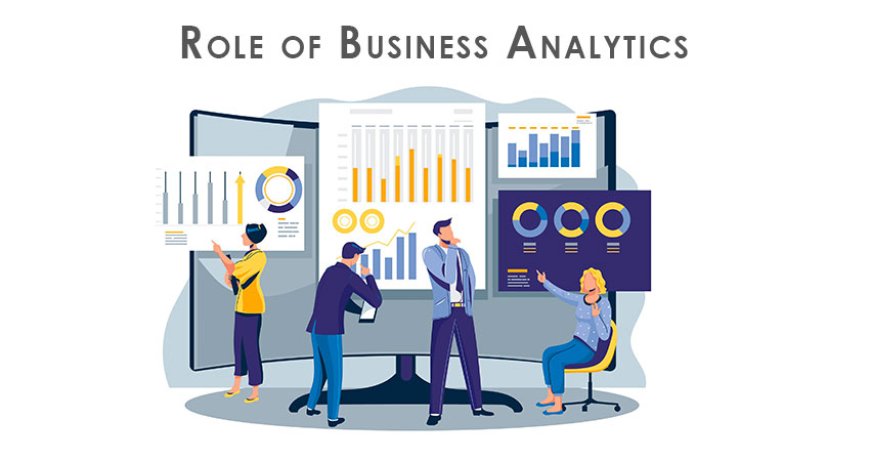The Role of Business Analytics in Decision Making: Turning Data into Action
Business analytics enhances decision making by using data-driven insights to identify trends, patterns, and opportunities for strategic actions.

In today's dynamic business landscape, the convergence of data and strategic insights has never been more pivotal. At the heart of this transformation lies Business Analytics – a discipline that unearths patterns, distills complexities, and empowers organizations to make informed decisions. Business Analytics holds the key to unlocking the full potential of data, guiding businesses toward effective decision-making that underpins success. As we embark on this exploration, we delve into the very essence of Business Analytics, its profound role in driving business success through strategic choices, and a comprehensive overview of how it catalyzes and elevates decision-making processes across industries.
Understanding Business Analytics
Business Analytics, at its core, is a multifaceted discipline that employs data-driven techniques to transform raw information into actionable insights, fostering intelligent decision-making within organizations. It encompasses a spectrum of methodologies, including data mining, statistical analysis, predictive modeling, and data visualization, all aimed at uncovering hidden patterns, trends, and correlations within vast datasets. By harnessing the power of Business Analytics, businesses gain a comprehensive understanding of their operations, customers, and markets, enabling them to make strategic choices that drive growth, enhance operational efficiency, and maintain a competitive edge. Through a synergy of data exploration and strategic interpretation, Business Analytics empowers organizations to navigate complexity, capitalize on opportunities, and navigate a successful course toward their goals.
The Decision-Making Landscape
-
The complexities of modern business decisions are shaped by global markets, technological disruptions, and ever-changing consumer behaviors.
-
Data-driven insights have emerged as the cornerstone of informed choices, empowering decision-makers with a panoramic view of options and potential outcomes.
-
Conversely, the repercussions of poor decision-making reverberate through organizations, manifesting in missed opportunities, operational inefficiencies, and compromised competitiveness. This section delves into the multifaceted nature of decision-making, highlighting the pivotal role of data-driven insights in navigating this intricate landscape and steering businesses toward prosperous trajectories.
Leveraging Data for Strategic Insights:
-
Historical data, a treasure trove of past events and patterns, forms the foundation for trend analysis, offering valuable insights into market shifts and consumer preferences.
-
Through predictive modeling, businesses peer into the future, anticipating potential scenarios and aligning strategies to capitalize on emerging trends.
-
The realm of prescriptive analytics takes this a step further, providing actionable recommendations for optimal courses of action, fine-tuning decision-making and enabling organizations to navigate complexities with precision.
Enhancing Risk Assessment and Mitigation:
-
Business Analytics empowers organizations to identify and evaluate potential risks by analyzing historical data, market trends, and external factors.
-
Real-time monitoring and predictive analytics work in tandem to detect anomalies and potential threats, enabling swift interventions to prevent adverse outcomes.
-
Through data-driven insights, businesses develop proactive strategies, strengthening risk mitigation efforts and ensuring resilience against unforeseen challenges. This section explores how Business Analytics serves as a shield against uncertainties, allowing businesses to navigate risks with clarity and confidence, ultimately fortifying their stability and sustainability.
Customer-Centric Decision Making
-
Through Business Analytics, organizations decipher customer behaviors, needs, and preferences, shaping decision-making to align with these insights.
-
The essence of customer-centricity lies in the seamless fusion of data-driven insights and empathetic understanding, leading to enhanced customer experiences and unwavering loyalty.
-
As product offerings, strategies, and interactions echo customer desires, Business Analytics serves as the orchestrator of a symphony where decisions harmonize with customer expectations. This section illuminates how the fusion of data and customer centricity transforms decision-making, propelling businesses toward a realm where each choice resonates with customer needs, fuels growth, and perpetuates a virtuous cycle of mutual benefit.
Operational Efficiency and Resource Allocation
-
By delving into data, businesses identify bottlenecks, inefficiencies, and areas for improvement, enabling targeted enhancements across processes.
-
In the realm of resource allocation, Business Analytics equips decision-makers with insights that strike a delicate balance between optimizing costs and maximizing outcomes.
-
The outcome is a synchronized symphony of streamlined operations and resource allocation, where data-driven precision fuels growth while minimizing waste. This section explores how Business Analytics empowers organizations to achieve operational excellence, orchestrating a symphony where every note of efficiency contributes to a harmonious crescendo of growth and success.
Future Trends in Business Analytics and Decision Making:
-
AI and Automation Integration: Increased incorporation of artificial intelligence and automation for advanced insights and streamlined decision-making processes.
-
Explainable AI: Focus on making AI algorithms more transparent and understandable, fostering trust and accountability in decision-making.
-
Real-time Analytics: Rapid growth of real-time data processing and analysis for more immediate and actionable insights.
-
Blockchain for Data Integrity: Adoption of blockchain technology to ensure data security, integrity, and transparency in decision-making processes.
-
Ethical Considerations: Heightened awareness of ethical implications, leading to responsible data usage and decision-making aligned with societal values.
-
Self-Service Analytics: Democratization of data access through user-friendly self-service analytics tools, empowering more stakeholders to make data-driven decisions.
-
Personalization at Scale: Expansion of personalized customer experiences through advanced analytics, enhancing customer satisfaction and loyalty.
-
Impact of Quantum Computing: Exploring the potential of quantum computing to revolutionize complex data analysis and decision optimization.
-
Interdisciplinary Collaboration: Greater integration of data scientists, analysts, domain experts, and decision-makers, fostering a holistic approach to decision-making.
-
Data Monetization: Leveraging data as an asset by monetizing insights and selling data-driven products or services.
As the business landscape evolves, the significance of informed decisions cannot be overstated. Business Analytics empowers organizations to navigate complexities, mitigate risks, and uncover opportunities that would otherwise remain concealed. By dissecting historical data, predicting future trends, and prescribing optimal actions, Business Analytics serves as a guiding compass, leading businesses toward prosperous horizons.
We have witnessed how Business Analytics enhances risk assessment, elevates customer engagement, optimizes operations, and charts the course for customer-centric strategies. The seamless integration of data-driven insights and decision-making has become the cornerstone of success, driving organizations to achieve operational excellence, elevate customer experiences, and catalyze innovation.
Moreover, as we peer into the future, we glimpse a landscape shaped by AI integration, ethical considerations, real-time analytics, and quantum computing. These emerging trends underscore the evolving nature of Business Analytics, where responsible data usage, transparency, and agility will continue to steer decision-making toward transformative outcomes.
In closing, the convergence of Business Analytics and decision-making transcends mere analysis – it's a dynamic partnership that empowers organizations to harness the true potential of data. By leveraging the insights garnered through Business Analytics, decision-makers can navigate uncertainty with clarity, drive growth with precision, and embark on a journey of continuous improvement, ultimately shaping a future where data-driven decisions propel businesses toward unparalleled success.












































